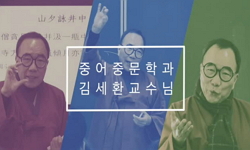The precedent studies of the poetry works of JohUi(曺偉) have produced some considerable results. They are not, however, sufficient in respect of criticism that helps one to appreciate a work by analyzing its aesthetic structure. This writing aims t...
http://chineseinput.net/에서 pinyin(병음)방식으로 중국어를 변환할 수 있습니다.
변환된 중국어를 복사하여 사용하시면 됩니다.
- 中文 을 입력하시려면 zhongwen을 입력하시고 space를누르시면됩니다.
- 北京 을 입력하시려면 beijing을 입력하시고 space를 누르시면 됩니다.

매계(梅溪) 조위(曺偉) 한시(漢詩)의 문예미학적 성취 = The Literary Aesthetic Achievements of the Chinese poems by MaeGye(梅溪) JohUi(曺偉)
한글로보기https://www.riss.kr/link?id=A75076249
- 저자
- 발행기관
- 학술지명
- 권호사항
-
발행연도
2007
-
작성언어
-
-
주제어
조위 ; 曺偉 ; 유호인 ; 兪好仁 ; 한시 ; 漢詩 ; 문예미학(文藝美學)적 성취 ; JohUi ; Youhoin ; Chinese poems ; Literary Aesthetic Achievements
-
KDC
800
-
등재정보
KCI등재
-
자료형태
학술저널
-
수록면
239-274(36쪽)
- 제공처
-
0
상세조회 -
0
다운로드
부가정보
다국어 초록 (Multilingual Abstract)
The precedent studies of the poetry works of JohUi(曺偉) have produced some considerable results. They are not, however, sufficient in respect of criticism that helps one to appreciate a work by analyzing its aesthetic structure. This writing aims to be a help to discover great works of Chinese poetry and for the precedent studies to have firm internal bases. The contemporary writers of JohUi regarded him a substantial poet. For example, King Sungjong(成宗), who had a deep appreciation of literature, presented JohUi`s accomplishment in literature as a model for encouraging poetry. Sunghyun(成俔) and Hongguidal(洪貴達) expected him to lead the literary world. Moreover, Huhgyun(許筠), the best critic of the Joseon Dynasty, evaluated in the Kukjosisan(國朝詩刪) the achievement of JohUi`s poems. Attentions to Youhoin(兪好仁) should be paid as a figure helping JohUi to cultivate literary attainments. Maegyejip(梅溪集), a collection of JohUi`s poetry works, has five pieces related to Youhoin, and Noigyejip(梅溪集), a collection of Youhoin`s works, contains a number of poems related to JohUi. Analyzing these works has revealed that their relationship was mainly a literary one through practices of literature as well as a companionship from the fact that they had been fellow students of Kimjongjik(金宗直). The works of JohUi appeal to their readers by uniting three aesthetic factors in a successful way: profound ideas and feelings, true experience of life, and large knowledge of art. In Donjungwuuem(途中偶吟), the tree factors are fully organized. It vividly shows JohUi who was determined to have a political success looking down the town where his parents lived. JohUi had already write on the basis of deepened ideas, and after serving as a government officer he showed great talent for literature. Kangdohoigo(江都懷古) demonstrate respectable advice of history by retrospection and which is outstanding in expressing ways of ``Hoigyunjunjung(繪景傳情)`` and an argument that is warm and kind. Uijudojungekgonkey(義州途中憶昆季) moves its readers by the frank confession of brotherhood without any pretense. It takes the system of development that has ``introduction-development-development-conclusion`` to give some impression of repetition, which increases veracity of the work in a special situation of an exile.
동일학술지(권/호) 다른 논문
-
- 우리한문학회
- 안대회 ( Dae Hoe Ahn )
- 2007
- KCI등재
-
여행을 통한 산수(山水)와 생활(生活) 공간(空間)의 인식(認識)
- 우리한문학회
- 김남기 ( Nam Ki Kim )
- 2007
- KCI등재
-
- 우리한문학회
- 신영주 ( Young Ju Shin )
- 2007
- KCI등재
-
17세기 조선의 한문학에 나타난 음악과 무용 풍속 -별곡,(別曲),호무(胡舞),항장무(項莊舞)를 중심으로-
- 우리한문학회
- 이지양 ( Ji Yang Yi )
- 2007
- KCI등재




 KCI
KCI KISS
KISS






